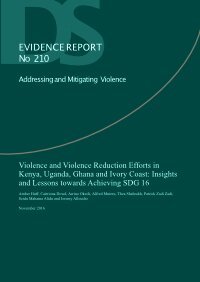Violence and Violence Reduction Efforts in Kenya, Uganda, Ghana and Ivory Coast: Insights and Lessons towards Achieving SDG 16
By Amber Huff, et al.
This report develops evidence-based insights into contextual dimensions of violence and practices on reducing violence, from multiple perspectives and at multiple levels of governance. In presenting our analytic narrative we are particularly interested, first, in the intersection of three crucial dimensions of violence over time: (1) the incidence, types and overarching patterns of violence documented in and across the focal countries and regions, including sub-national and international geographies of violence; (2) key actors and institutions implicated in trajectories of violence and peace; and (3) processes of political change, including (but not limited to) violence reduction efforts. Across all four cases, the politicisation of ethnicity; sub-national variation in political power, inclusion, development and growth; and the variable types and consequences of violence across different groups and communities, are common threads that shape the trajectories of violence and the success and efficacy of mitigation and management strategies. Second, our cross-regional analysis assesses the role of trans-border, cross-regional and international processes in spanning systems of violence and mitigation, including legacies of colonisation and de-colonisation, influences of international peace-building initiatives, transnational actors and flows, and broad trends in extractionist development. The focus of our analysis is on two blocks of neighbouring countries in sub-Saharan Africa that have diverging violence trajectories and differing experiences of addressing violence: Kenya and Uganda in East Africa; and Ghana and Ivory Coast in West Africa. Using analyses of secondary literature and of data (from 1997) compiled by the Armed Conflict Location & Event Data Project (ACLED), we combine mixed-method case studies with process tracing and tiered comparison. This approach facilitates an understanding of the role of multiple factors, including governance and the evolution of institutions and justice mechanisms over time, in facilitating the emergence of violence and reducing violence at multiple levels, from sub-national to cross-regional.
Brighton, UK: Institute of Development Studies, 201. 95p.


